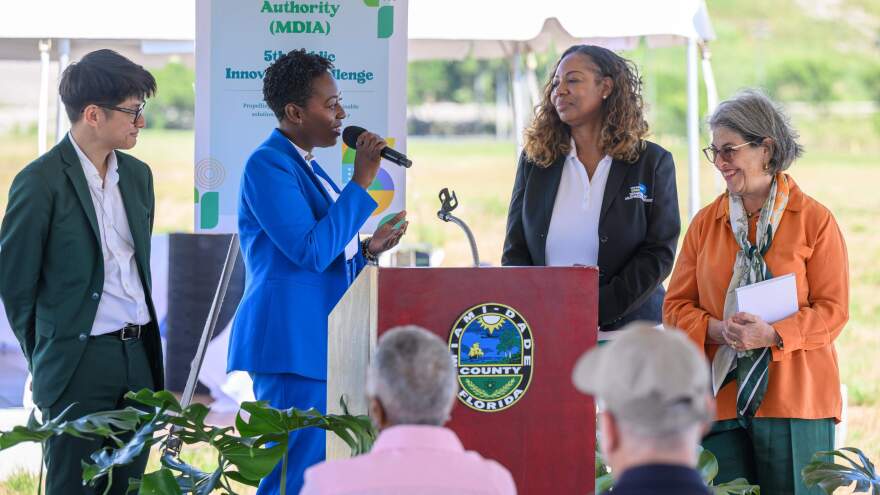Miami-Dade is getting creative about one of its stinkiest problems: garbage.
“The secret is our waste is somebody else’s treasure,” Mayor Daniella Levine Cava said Saturday at the old South Dade landfill in Homestead.
The county teamed up with the Miami-Dade Innovation Authority, a non-profit that connects businesses to government, to pick three start-ups for pilot projects aimed at reducing and recycling more of our trash. Each company gets $100,000 to kick off its idea.
Two of the winners are homegrown: Clean Earth Innovations, which turns yard waste into “biochar,” and Fertile Earth Worm Farm, which transforms food scraps and other organic waste into compost. The third winner is Scrapp, an app that helps people figure out what goes where when tossing out their trash. More than 80 companies applied from across the U.S. and abroad.
“We believe this marks a new era in waste management in Miami-Dade County,” Lanette Sobel, founder of Fertile Earth Worm Farm, said.
The challenge was sparked by the aging Covanta incinerator in Doral burning down in 2023, forcing the county to ship garbage some 100 miles north, Levine Cava said. But that challenge, she said, created opportunity.
By partnering directly with small businesses, the county hopes to cut through some of the “red tape” that usually slows big government changes, she said.
Having organic materials in the landfill is a problem because when it breaks down it creates methane, a “greenhouse gas” much more potent than CO2. About 30 percent of the county’s trash is food and other organic waste, and another 10 percent is yard waste. The new projects aim to bring those numbers down and stretch the life of a landfill that’s nearing capacity.
That includes hundreds of thousands of tons of green waste every year. Clean Earth Innovations CEO Harold Gubnitsky said the company plans to open a biochar facility at the South Dade landfill by January. Biochar is made by “baking” waste — a process called pyrolysis that heats materials without oxygen.
The result looks like charcoal and can boost soil health. Research suggests it may even filter water or be added to animal feed.
“It’s fighting climate change, turning waste into value and creating a circular economy, because now there’s an opportunity to create jobs around these processes,” Gubnitsky said.
Another big issue: people don’t recycle properly. About 40 percent of recyclable materials end up contaminated. That’s where Scrapp comes in.
“If we make information radically accessible to where nobody has a question about what goes where, and you democratize that access to where businesses and communities can all be on the same wavelength, that’s going to drive the real change,” said Mikey Pasciuto, co-founder and chief sustainability officer at Scrapp.
Ashley Miznazi is a climate change reporter for the Miami Herald funded by the Lynn and Louis Wolfson II Family Foundation and MSC Cruises in partnership with Journalism Funding Partners.
This story was originally published by the Miami Herald and shared in partnership with the Florida Climate Reporting Network, a multi-newsroom initiative founded by the Miami Herald, the Sun-Sentinel, The Palm Beach Post, the Orlando Sentinel, WLRN Public Media and the Tampa Bay Times.





